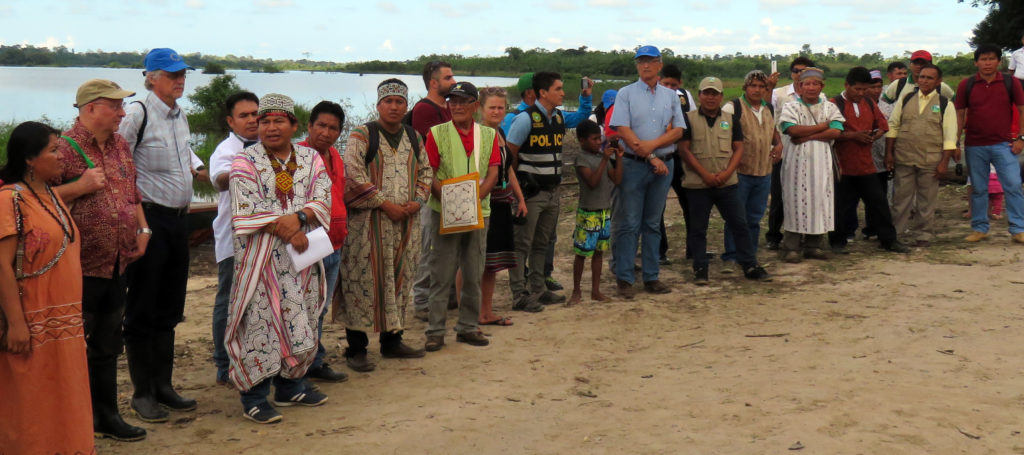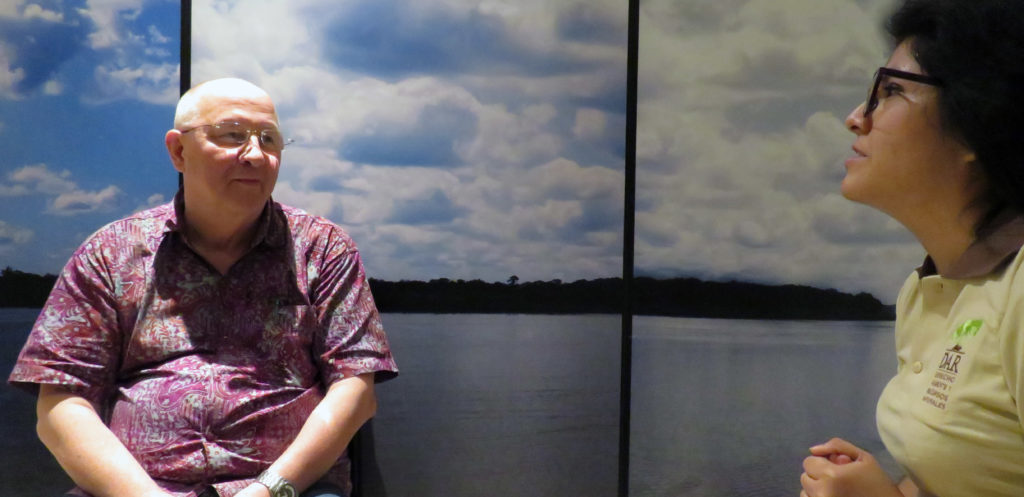Tuesday 20th of June 2017. – The Expert for Tropical Silviculture and Nobel Prize Winner of 2007, Markku Kanninen, during the last couple of days accompanied the activities of the Mission of the ambassadors of the European Union in Peru who visited the city of Pucallpa to verify issues related to the handling of the conservation of the Peruvian Amazon Forest Region.
During his stay he spoke exclusively to “Derecho, Ambiente y Recursos Naturales” (DAR) and shared his opinion relating the role of the indigenous communities with the conservation of the forest in the Amazon Region of Peru:
“I believe that the indigenous community has a highly important role for the areas that are located in their ancient lands; (…) we need to give them all the rights necessary to conserve these woods independently (…) obviously within the borders of the law and rules of procedures and in the light of a sustainable handling of the forest”, said Kanninen.
Furthermore the Nobel Prize Winner of 2007 states that the Independence is a key factor to insure a forest monitoring that fulfills its function:
“I think that first of all it is important to have a monitoring, may it be permanent or not, that is independent from the actors in the forest, meaning that these actors cannot monitor their impact themselves because this can lead to a situation where on paper all looks very good but the reality isn’t”.
In the light of an independent monitoring it is “important to have an agent or an organization that works independently from the organizations that are executing the plan [of conservation]. Therefore (…) the system of indigenous monitoring can be a very good solution”.
Indigenous Monitoring in Peru
In Peru the official regulations of the forest handling have approved the monitoring, control and supervision enforced by the communities in order that they can form Committees of Control and Forest Monitoring (Article 148 of the Law 29763, Legislation on Forest and Silvicultural Fauna), but the regional governments are still to recognize Committees or other forms of communitarian organization who are touched by the Law (Article 127 of the Regulation for the Conservation of the Forest and Silvicultural Fauna in the native communities).
At the moment this type of surveillance is formed by “Forest Inspectors” and executed by the same indigenous organizations and their communities.
On the other hand organizations like ORAU have raised the voice to pronounce the importance of the development of the communitarian forest surveillance as an economic factor, making it necessary to create the “Unidades Técnicas de Manejo Forestal Comunitario” (UTMFC), being in the responsibility of the regional government, as article 21 of the Forest and Silvicultural Fauna Law and Article 16 of the Regulation on the for the Conservation of the Forest and Silvicultural Fauna in the native communities deploys.
Additionally, given that the indigenous surveillance is encompassing (woods, fishing, quality of the environment, territory, impact of petroleum production activities, and so on), ORAU is promoting a regional regulation for the recognition of this surveillance. At the same time, on the national level, multiples indigenous organizations brought up the necessity that the State recognizes the indigenous surveillance by passing the legal project Ley N° 336/2016-CR in the national parliament.
Kanninen and the surveillants in Ucayali

As part of his activities in Pucallpa, Kanninen accompanied last Friday the delegation of the ambassadors of the European Union who visited the native community of Santa Teresita in order to get to know the life of the community and the system of indigenous surveillance of the regional organization AIDESEP Ucayali – ORAU, comprising the “Forest Inspectors” (forest conservation), legal promoters (monitoring the impact of petroleum production), and Agents of security PIACI (protection of the indigenous reserves and territory).
This visit was part of the activities of the project “Fortaleciendo la vigilancia indígena” (strengthening the indigenous surveillance), implemented by the indigenous organizations of ORAU, COMARU, CARE and ACODECOSPAT in coordination with “Derecho, Ambiente y Recursos Naturales” (DAR) and the support of the European Union.



